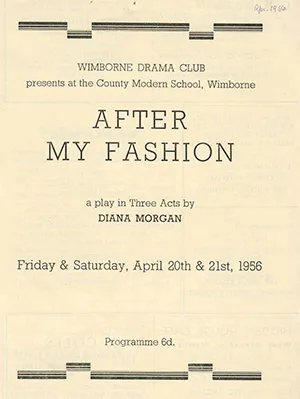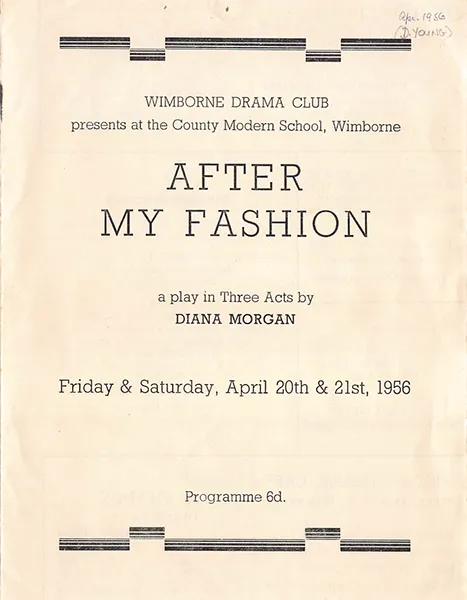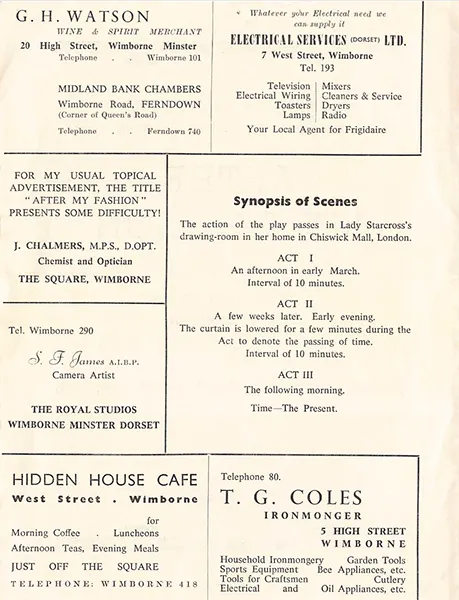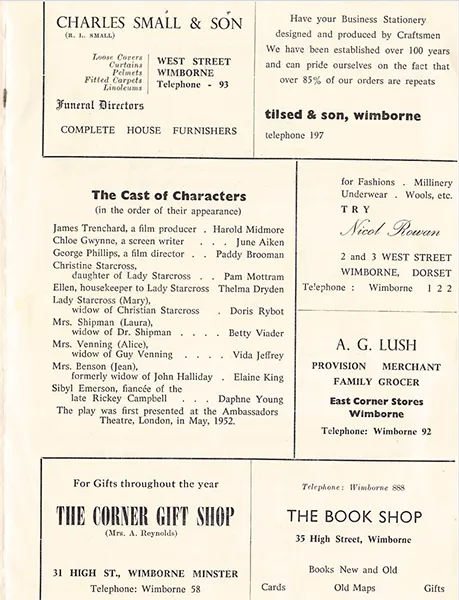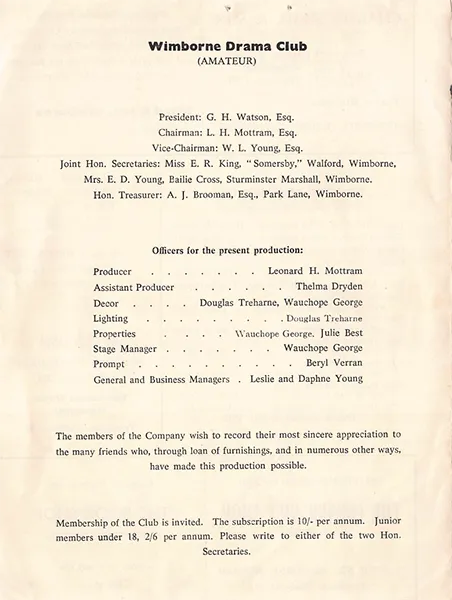Written By
Diana Morgan
Where and When
20th – 21st April 1956 @ County Modern School, Wimborne
The Plot
Twenty years ago Christian Starcross led an expedition to Tibet – he and his five companions perished. The heroism of the men and Christian in particular has been promoted for years. A film company approaches Christian’s widow Lady Starcross – they wish to make a film about the expedition. The four widows and the fiancee of the fifth – Sybil – meet at Starcross Hall to discuss the matter. Sybil is against a film being made. She confronts Lady Starcross telling her that she was Christian’s lover and that she knew about the fraudulent things Christian had done for self promotion. Lady Starcross reads from Christian’s last letter. He confesses his wrong doings and that he had never loved Sybil. The film’s script writer and producer learn about all this. Both have hero worshipped Christian all their lives. The scriptwriter wants to cancel the film – but the producer thinks it should go ahead as an heroic tale and be an inspiration to all. Lady Starcross and her companion know that the last letter was addressed to Sybil and it was not Sybil he said that he did not love.
Cast
- James Trenchard – Harold Midmore
- Chloe Gwynne – June Aiken
- George Phillips – Paddy Brooman
- Christine Starcross – Pam Mottram
- Ellen – Thelma Dryden
- Lady Starcross – Doris Rybot
- Mrs Shipman – Betty Viader
- Mrs Venning – Vida Jeffrey
- Mrs Benson – Elaine King
- Sibyl Emerson – Daphne Young
Creative Team
- Producer – Leonard H. Mottram
- Assistant Producer – Thelma Dryden
- Decor – Douglas Treharne and Wauchope George
- Lighting – Douglas Treharne
- Properties – Wauchope George and Julie Best
- Stage Manager – Wauchope George
- Prompt – Beryl Verran
- General and Business Manager – Leslie Young and Daphne Young
Gallery


Reviews
After My Fashion, play in three acts by Diana Morgan, first presented at the Ambassadors Theatre in London in 1952 was performed by Wimborne Drama Club at the County Modern School on Friday and Saturday, and the cast made an excellent attempt to master this difficult play.
The production and scenery were good and apart from one or two minor weaknesses, the cast acquited themselves well, outstanding among them being Vida Jeffrey as Alice Venning.
The action of the play takes place in London at the present time and is concerned with the tangle of deceit and vanity that occurs when James Trenchard, a film producer (played by Harold Midmore) proposes to make a film of “the magnificent failure”. This failure was an attempt by five men to reach a lost city in Tibet which was in reality, a figment of the imagination of the leader of the expidition, Christian Starcross (alias Leonard Williamson). In a vain attempt to achieve immortality, he has led five men to their deaths.
The reactions to the making of the film of the five women left behind are mixed. Lady Starcross is not darkened , even though she knows – and has known ever since his death – that he was in love with Sybil Emerson (Daphne Young). Miss Emerson was the fiancee of the late Ricky Campbell, also a member of the expedition.
The play reaches it’s climax at the end of the second act, when the truth comes out, and Sybil Emerson hysterically denounces Starcross. Unfortunately the denouncement was underplayed, although Paddy Brooman, as the film director who worshipped Christian Starcross, and who has a reason for not wanting to make the film after his college-day dreams have been shattered, gave an outstanding performance.
Others taking part were June Aiken, as Chloe Gwynne, a screen writer; Thelma Dryden, as Ellen, the maid; Pam Mottram, as Christine Starcross; Betty Viader as Mrs Shipman, and Elaine King as Mrs Benson.
Congratulations for production go to Mr L. H. Mottram. Others concerned with the production were Thelma Dryden (assistant producer); Douglas Threharne and Wauchope George (decor and lighting); Wauchope George and Julie Best (properties); Wauchope George (stage manager); Beryl Verran (prompt); Leslie and Daphne Young (general and business managers).
Drama Club’s Choice
To tackle an “out of the rut” play occasionally is excellent policy for amateurs and Wimborne Drama Club are to be congratulated on the enterprise they have shown, from time to time, in this respect. Diana Morgan’s drama, “After My Fashion,” which they presented at the County Modern School last week, was not, however, as happy a choice as most of their earlier ventures.
Primarily psychological studies, plays of this type are largely static, relying for dramatic force upon skilled emotional playing and vivid characterisation; and as most amateur groups must, perforce, cast to type, the resulting productions inevitably lack depth. Nevertheless, the cast gave a performance which was notable for its sincerity, and deserved better support than that indicated by the sparsely-filled hall.
Doris Rybot was an admirably restrained Lady Starcross, her playing contrasting well with the forthright attack of Daphne Young’s Sybil Emerson. Harold Midmore’s James Trenchard was well conceived; and he was capably supported by Paddy Brooman as George Phillips.
Betty Viader, Vida Jeffrey and Elaine Ring were convincing as the three widows, Laura, Alice and Jean; Pam Mottram played with feeling as Christine Starcross; and June Aiken and Thelma Dryden gave good support respectively as Chloe Gwynne and the housekeeper, Ellen.
The play was well produced by Leonard H. Mottram, assisted by Thelma Dryden. Douglas Treharne was responsible for lighting, and also arranged decor in conjunction with Wauohope George, who stage-managed and assisted Julie Best with properties. Beryl Verran prompted, and Leslie and Daphne young shared the duties of general and business managers.

